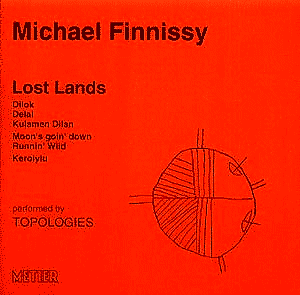My first encounter with Michael Finnissy's uncompromising
music was via the pianist Rolf Hind's recital for Tony Wilson's
regrettably short-lived Factory Classical imprint. Even alongside
Bartók and early James MacMillan, English Country-Tunes
seemed anything but what my received wisdom of what that title
might signify (certainly no cowpats around!) and engendered a
certain degree of trepidation on approaching the present disc.
However, this is very much not a recital grounded in the abstract.
A fair proportion of it is given over to pieces influenced by
the music of ethnic groups which have suffered as a result of
so-called "ethnic cleansing". In this case the reference is to
the Kurds and the people of Azerbaijan. This links neatly to the
title and obvious theme of the main work: Lost Lands. The
remaining works, again made patently obvious by their titles,
are influenced by blues music. All in all this is a very interesting
listen, not easy but certainly not by any means impenetrable.
The first three pieces, in which Julian Warburton's
excellent percussion underpins the reedsmen's hypnotic and near-improvisatory
utterances, are Kurdish in inspiration. The composer's honest
and informative notes place them in a wider context of Arabic/Islamic,
Ancient Greek and Karnatic musical traditions, with more contemporary
nods to Xenakis and Messiaen. Keroiylu also inhabits similar
musical territories, influenced by the folk music of the Caucasus,
with oboe and bassoon providing a particularly dense but engaging
framework. None of this music can be validly experienced in a
casual way but it should present little difficulty to anyone in
any way engaged with modern European jazz (as exemplified by certain
releases on ECM for instance). Even the "blues" pieces, unique
on the disc in that they are for oboe alone, require concentration
to appreciate fully but couldn't truly be described as hermetic.
Lost Lands itself, nearly 25 minutes in length, perhaps
could, yet I found it a very grateful listening experience, recalling
(in feeling, if not necessarily form) wonderful music like George
Benjamin's classic Eliot inspiration Ringed by the Flat Horizon.
Unsurprisingly, given my previous comment (Benjamin was a pupil
of the great Frenchman), I also sense a great Messiaen influence,
here more than in the composer's direct acknowledgement (see above).
Whatever, this is a fascinating disc all round and nowhere near
as difficult as Finnissy's previous press might indicate. Give
it a go!
Neil Horner
